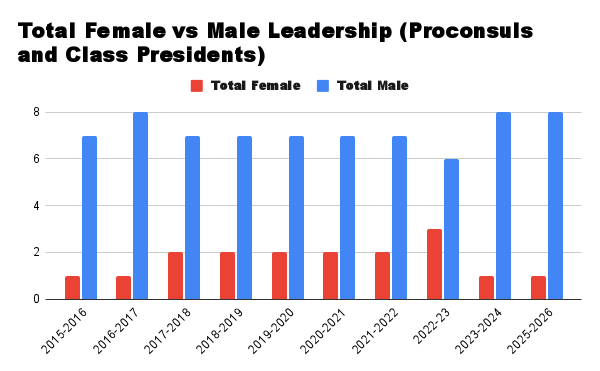Introduction
The first time I felt truly helpless was when I was surrounded by hundreds of protesters in downtown Honolulu. I held a bright sign advocating for women’s control over their bodies on June 22, 2024, the day the case of Roe v. Wade was overturned. My arms trembled in the afternoon sunlight, standing alongside other protestors; I could not help but feel lost in a sea of past and present feminists trapped in an endless cycle of oppression.
This begs the question: how far has feminism come? Even the wealthiest, most privileged females in society still lack the equality they sought to achieve since the first Women’s Movement. The emphasis of Hollywood’s portrayal of stereotypes, cultural representation and perspectives on social issues plays a significant role in public opinion regarding subjects like feminism. For example, Legally Blonde (2001) celebrates female strength by empowering women to break chains of societal expectations, providing important insights on feminism that are still prevalent today. Similarly, Taylor Swift can be used as a modernized example of how feminism continues to take its roots and the ways in which society responds.
As Ms. Theresa Falk ’86 stated, “Feminism is the other F-word.” This encapsulates how feminism has been regarded as a topic to tiptoe around rather than to critically seek solutions for. Like children who blush embarrassingly and are reprimanded for using swear words, society’s shameful perpetuation of sexism has been a delicate subject in nearly all aspects of politics, pop culture and modern life.
Legally Blonde’s Take on Feminist Issues
The beauty of Legally Blonde’s approach to “poking the bear” of feminism’s persistent presence in society is its use of feminine stereotypes to forcefully make the audience reflect upon patriarchal practices that often go unnoticed or normalized. It is just one of many movies during the early 2000s that began to focus on the formerly normalized sexist portrayals in Hollywood films.
For instance, Elle Woods, the protagonist in Legally Blonde, is portrayed as the “typical girly girl” as a sorority sister, pink lover, ditzy blonde and wealthy daddy’s girl. Despite these feminine stereotypes that characterize Woods, she is ultimately painted as a feminist who proves that intelligence and hard work is not based on gender, embracing a career as a successful lawyer.
Reflecting on Legally Blonde, Mrs. Heather Muraoka ’95 raised the question: “Can a girl wanting to be feminine and follow her boyfriend to Harvard Law School still be a feminist?” Ultimately, one must ask if being a feminist in the 1900s during the first wave of feminism movements looks the same as being a feminist in the twenty-first century. In her History of American Women course, Mrs. Muraoka explores ideas like this through passionate class discussions analyzing the development of women’s roles and rights throughout history. She argued that “history is closer than we realize, and its gendered lens makes it more relatable,” in reference to students’ passion for her class. The power of history lies in who is spinning the story, and unfortunately the female perspective has been neglected for centuries. Mx. Adrian Khactu stated, “There is a reason, for instance in the 1800s, that female anger was diagnosed as a mental condition: hysteria.” Despite Legally Blonde’s release date of over 20 years ago, its themes on feminism and gender-based stereotypes are still prevalent and require modern solutions.
Modern Application Example
Another pop culture icon of a blonde, feminine figure advocating for women’s rights and equality is Taylor Swift via the way she uses her platform to shed light on sexism. To defend herself against sexist stereotypes that perpetuate unjust double standards against women, both in the music and entertainment industry as well as everyday life, she produced the song: “The Man.”
One lyric that stood out in particular is, “They wouldn’t shake their heads and question how much of this I deserve.” It is comparable to Elle Woods being perceived as undeserving for her spot in Harvard. In addition, Woods’ professor had hit on her and disregarded her intelligence, thus perpetuating the sexist idea that Swift references: women’s accomplishments are often questioned by authority figures and society. Therefore, both are an example of feminist stereotypes– one from the early 2000s in Legally Blonde and the other in Swift’s 2020 portrayal of persisting double standards.
A good demonstration of the main message of “The Man” is conveyed through the quote, “I’m so sick of running as fast as I can, wondering if I’d get there quicker if I was a man.” This illustrates the systemic patriarchy that prevents women from gaining equality. Individuals should not have to wonder if their life would have been easier simply because of their gender, and this is comparable to being defined by other characteristics like race or gender identity.
Navigating this Inequality
Therefore, Legally Blonde’s portrayal of feminist stereotypes in an academic setting as well as Swift’s advocacy against normalized gender biases allows for gender inequalities to stand in the spotlight. It is crucial that all individuals, regardless of gender, understand society’s gender biases and associated modern politics, though one must also learn to navigate these inequalities. There is no singular way to deal with gender-based prejudices, but having an educated, courageous mindset is a crucial step in the right direction.
‘Iolani School provides opportunities to learn about modern day issues like this through seminars like MAGIC and CAATS, which are seminar courses that inform passionate students about gender studies and Asian American perseverance. According to Ms. Falk, “The most valuable lesson one can teach is the ability to sit within their discomfort, learn from it, and acknowledge it.” She also shared that if she could go back in time, she would not stray from being herself, but rather “take up more space.” We ultimately have the power to control our actions and perception of ourselves, so rather than conforming to sexist expectations, push the boundaries and unapologetically be yourself.














